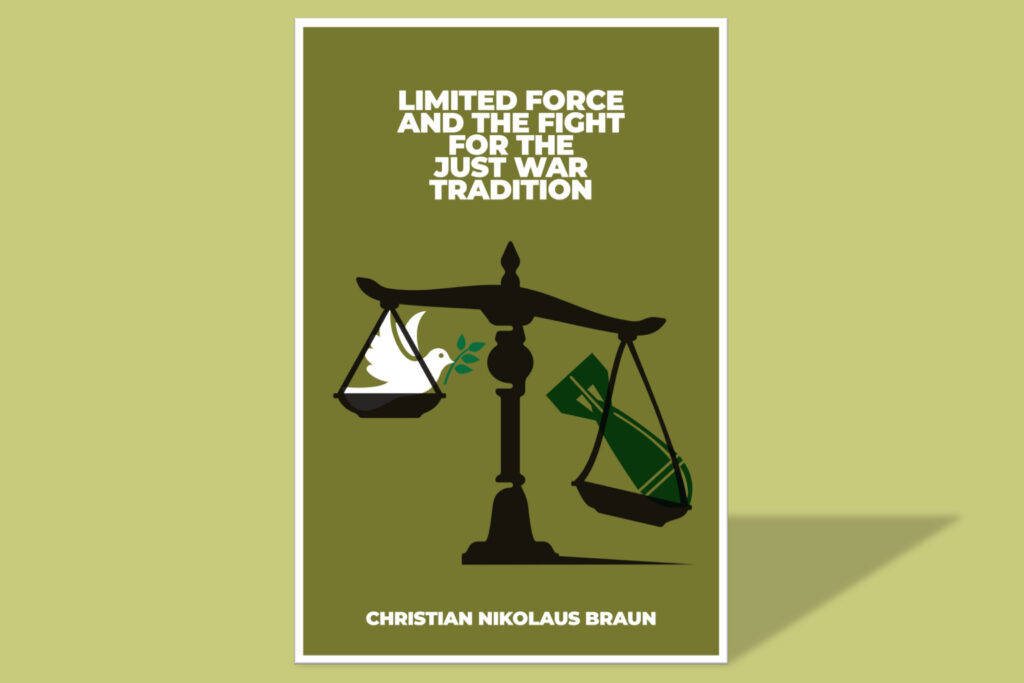In today’s increasingly polarized international community, the criteria defining a just war—that is a war deemed morally or theologically just—are subject to intense debate. In Limited Force and the Fight for the Just War Tradition, Christian Nikolaus Braun illustrates the scholarly debate between the two major contemporary just war ideologies (the Walzerians and the revisionists) and argues for a third-way approach. In the first part, Limited Force and the Promise of a Third Way Approach, Braun outlines the historical discussion between the two ideological camps of just war thought and introduces the potential for a third-way approach to just war. Walzerians imagine jus ad vim, the moral principles associated with limited force, as a third distinct moral framework besides those of war and peace. However, revisionists adhere solely to one ethical framework that they argue applies consistently, rendering jus ad vim redundant. By providing the reader with a comparative analysis of the primary approaches to just war and offering contemporary examples, Braun offers a third approach to the predominant just war camps, introducing a novel perspective based on historical principles outlined by Aquinas.
The first two parts of this book explore the debates about jus ad vim, the fight for the just war tradition and the bellum justum (theory of just war) of Aquinas. Braun asserts that Aquinas, influenced by Aristotle, has impacted modern thought immensely, specifically surrounding just war.[1] Braun argues that “the work of Aquinas is of particular importance for the just war tradition as he systematized classical just war by bringing together various streams of thought that ‘had been shaped by philosophical, theological, and political thinking on natural law by military thought and practice, by legal traditions reaching back into Roman Law, and by accumulated experience in the government of political communities.’”[2] Thus, Aquinas’ just war ideology became the foundation for arguments by later thinkers. Examining other historical arguments such as Thomistic just war, Braun argues that Aquinas’s criteria for just cause, and right intention must be met. As for these criteria, Aquinas developed his “thinking on bellum justum as the right of an injured state to wage war to heal a violation of justice or to protect the common good.”[3] This paves the way for discussing the moral debate of war as retribution due to Aquinas’s argument for right intention and its place in the classical bellum justum—despite being ignorantly overlooked by contemporary just war thinkers. Braun states that “the idea of retribution as a just cause for war has overwhelmingly been rejected in today’s conversation about the morality of war.”[4] However, he exhibits examples of cases today that potentially undermine the contemporary rejection of retribution as a just cause for war.
In the final part of his book, Braun portrays two particular manifestations of limited force through the United States’ practices of targeted killing and limited air strikes to enforce international norms. One example he illustrates is the targeted killing of Osama Bin Laden, relying mainly on Mark Bowden’s account due to his proximity to key decision-makers during this time. Emphasizing the complexities of this case due to the differing records of events, he also analyzes the Hersh account—the official account of the White House. He meticulously explains the United States’ justification for Osama Bin Laden’s targeted death is based on the “continuing threat” that his presence posed to the United States.[5] Therefore, this attack on Osama Bin Laden would be accepted by both Walzerians and Revisionists due to its “preemptive” nature. Yet, Braun hints at the aspects of this attack that conflict with the “self-defense” narrative due to statements by the Obama administration after Bin Laden’s death, which included phrases such as “justice has been done.”[6] Thus, he sparks moral debate surrounding “right intention” and provides an argument for regulating particular examples of limited force.
Overall, Braun stresses the validity of the Walzerian belief that it is necessary to regulate acts of vis (also known as the “right to force”). However, he also agrees with the revisionists’ argument that as an independent moral framework, jus ad vim is redundant. Thus, using these two approaches combined with the just war thinking of Aquinas, he hopes to spark a constructive exchange between Walzerians and revisionists. Despite the contemporary academic rejection of the just cause of retribution, Braun also precisely illustrates that retribution remains alive in the thought process behind the limited force that is used today. This conclusion is seemingly accurate given that much of the violence today is driven by acts of retribution rather than solely defense which highlights the importance of discussions surrounding “right intention”. To support this argument, Braun meticulously examines the two military practices of targeted killing and limited strikes to enforce international norms, using historical examples from the United States. Throughout the book, Braun argues for “the morality of two particular uses of vis grounded in an interpretation that unites a trinity of twentieth-century revivals, those of just war, casuistry, and virtue ethics.”[7] Thus—drawing from Aquinas, his analysis of Walzerian and revisionist just war, and his detailed exploration of modern just war cases—Braun suggests a return “to the classical understanding of bellum justum in the context of limited force.”[8]
References
[1] Christian Nikolaus Braun, Limited Force and the Fight for the Just War Tradition (Washington D.C.: Georgetown University Press, 2023), 73.
[2] Ibid, 76.
[3] Ibid, 98.
[4] Ibid, 97.
[5] Ibid, 143.
[6] Ibid, 143.
[7] Ibid, 220.
[8] Ibid, 222.




